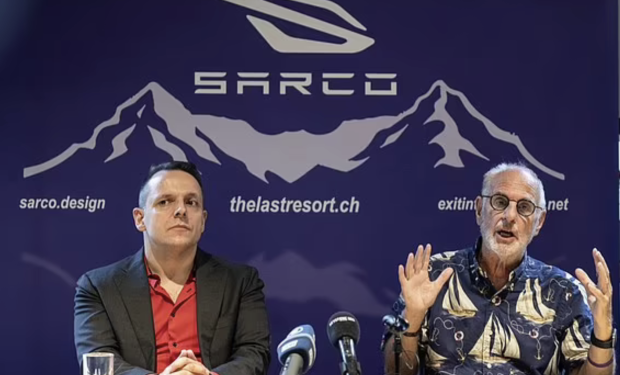June 3, 2025
Director of Sarco dies by assisted suicide after “unconscionable” detention
Director of Sarco suicide capsule dies by assisted suicide after “unconscionable” detention by Maud Effting and Haro Kraak.
The director of the Swiss suicide capsule Sarco, Florian Willet (47), has died by assisted suicide.
He died in Germany at the beginning of May.
Willet had fallen into serious mental health problems after the Swiss authorities accused him of murder following the launch of Sarco and imprisoned him for several months.
His death was announced on Sunday evening by Philip Nitschke, director of Exit International and the inventor of the Sarco. Nitschke says he has serious complaints about the Swiss judiciary’s treatment of Willet.
The director was not allowed to have any contact with the outside world for ten weeks.
After his release, he was in a state of acute psychosis. ‘I think his time in prison triggered this,’ says Nitschke. ‘The Swiss authorities knew there was no question of murder. And yet they held him for ten weeks.

Drs Florian Willet (left) & Philip Nitschke, Zurich July 2024
They behaved unscrupulously.
Nitschke, who lives in the Netherlands and developed the Sarco here, has a psychiatric report in his possession in which the psychiatrist writes that Willet suffered from an ‘acute polymorphic psychotic disorder’ that had ‘arisen as a result of the stress of the pre-trial detention and the associated processes.’
According to Nitschke, the report does not state that he had any previous mental health problems.
The report was drawn up in January, weeks after Willet’s release.
Final moments
Florian Willet was arrested by Swiss police in September last year, shortly after a 64-year-old American woman entered the suicide capsule in the woods of Schaffhausen, pressed the button and died.
The woman had wanted to die for some time. She died when nitrogen gas flowed into the capsule.
Willet was the only witness to her last moments and was standing outside the Sarco when she died.
Switzerland was chosen for the launch of the Sarco because assisted suicide is permitted there under certain conditions.
After Willet reported the woman’s death to the police, he was arrested. Nitschke: ‘The expectation was that he would simply be questioned and then allowed to go home. Instead, twenty police cars arrived, he was locked up and his two lawyers were also put in prison.
He was then completely unjustifiably charged with murder (vorsätzliche Tötung, ed.).
He had hardly any information and was not allowed to have any contact with the outside world, only with his lawyer. That was extremely stressful.’
No report
The fact that Willet is suspected of “intentional killing” – an accusation between murder and manslaughter – is based on a “telephone note” made by the public prosecutor on the evening of the American woman’s death.
He allegedly heard from the forensic doctor that there were signs of strangulation on the woman’s neck. But over time, this suspicion has become increasingly vague.
To date, no lawyer has seen the autopsy report. Nevertheless, Willet is being held in custody for weeks on the basis of this serious suspicion. During Willet’s detention, it emerged that there is CCTV footage – with sound – of the woman getting into the Sarco and dying.
De Volkskrant, which managed to get hold of this footage, conducted an extensive analysis and found no evidence of violence. The video footage shows the woman getting in herself and pressing the button. Willet is standing next to her and communicating with her.
He also communicates with Nitschke, who is watching via a camera. At the end, he says: “She really looks dead”.
The Swiss authorities waited two and a half months before downgrading the status of the suspicion of strangulation to “less urgent”. The authorities have not disclosed why.
According to Nitschke, Willet became “severely traumatised” in custody.
“When he was released in December,” says Nitschke, “he was a completely different person.” Willet’s best friend also says that she did not recognise him afterwards.
In a media statement, she describes him as a man who had previously been extremely stable and cheerful, and as someone with a great sense of justice.
A broken man
The pre-trial detention broke him, she says. “This friendly, positive man had turned into an anxious, suspicious person who no longer trusted even his best friends. He lived in his own world. He became increasingly distant from his friends.”
After his release, Willet was temporarily admitted to a psychiatric clinic twice. In early January, he was found under his balcony and seriously injured.
His best friend reported him missing in recent weeks. Only recently did she hear from the Swiss authorities that he had died in Germany.
Nitschke says he had regular contact with Willet in recent months. “But it was very difficult to really get through to him. He was severely damaged.
I suspect that the medical authorities in prison also saw this and that is why he was released so suddenly. I think they realised they had a problem.
He was suddenly put out on the street without knowing that this was going to happen.”
The Swiss Public Prosecutor’s Office was not available for comment on Sunday.
Right to self-determination
Willet died on 5 May in Cologne with the help of a specialised organisation, according to Exit International.
Assisted suicide has been legal in Germany for a few years.
In an obituary, Nitschke writes that Willet was a passionate advocate of the right to self-determination.
‘Florian wanted to make a difference,’ he said. ‘He wanted to help a terminally ill woman find a peaceful death.
He only thought of her.
His own well-being came second – and then far behind.
Everyone needs a Florian by their side in their final moments.
But he paid for his compassion with the ultimate price – his life.’